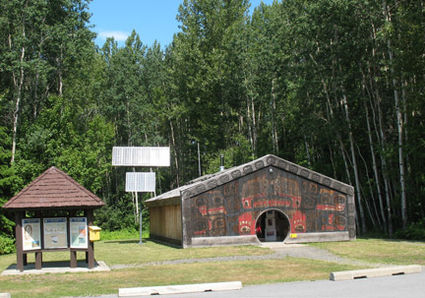Preserving Indigenous Language in British Columbia
Last updated 11/3/2019 at 2:35pm

Hans-Jürgen Hübner, creativecommons.org
The Nisga'a Lisims information center. This nation's language is one being strengthened by the Canadian government.
VANCOUVER, B.C.-The Government of Canada and Nisga'a Lisims Government are pleased to announce an agreement to support the Nisga'a Nation's efforts to revitalize its language.
The Government of Canada will invest up to $6 million over six years to fund Nisga'a Lisims Government's language revitalization plan. The plan was established based on Nisga'a Nation priorities, and includes gathering and collecting information on Nisga'a language, culture and traditional practices, all of which will assist Nisga'a Nation efforts to maintain and strengthen the Nisga'a language within the Nation.
In June 2019, the Indigenous Languages Act was granted Royal Assent. Section 10 of the Act provides the flexibility for the Government of Canada and an Indigenous group or government to enter into an agreement or arrangement, or to work through existing treaty relationships to revitalize and strengthen an Indigenous language.
The Nisga'a Nation, located in British Columbia, currently faces a rapidly diminishing number of fluent Nisga'a language speakers resulting in a loss of their culture and traditional practices.
"We are very delighted by this multi-year funding commitment from Canada for the revitalization of Nisga'a language, culture and traditional practices," says Eva Clayton, President of Nisga's Lisims Government. "It is a positive step in the right direction and truly demonstrates Canada's commitment to work with the Nisga'a Nation on a government-to-government basis consistent with the Nisga'a Treaty."
The United Nations Educational, Scientific and Cultural Organization (UNESCO) declared 2019 the International Year of Indigenous Languages. According to UNESCO, three out of four of the 90 Indigenous languages in Canada are considered endangered.
In 2016, only about 15.6 percent of Indigenous people in Canada could converse in an Indigenous language, down from 17 percent in 2011 and 21 percent in 2006.
On June 21, 2019, the Governor General of Canada granted Royal Assent to the Indigenous Languages Act. Since 2017, Canadian Heritage has worked with national Indigenous organizations to develop this historic legislation.
Budget 2019 committed $333.7 million over five years, starting in 2019–2020, and $115.7 million per year ongoing to support the implementation of the Indigenous Languages Act.

